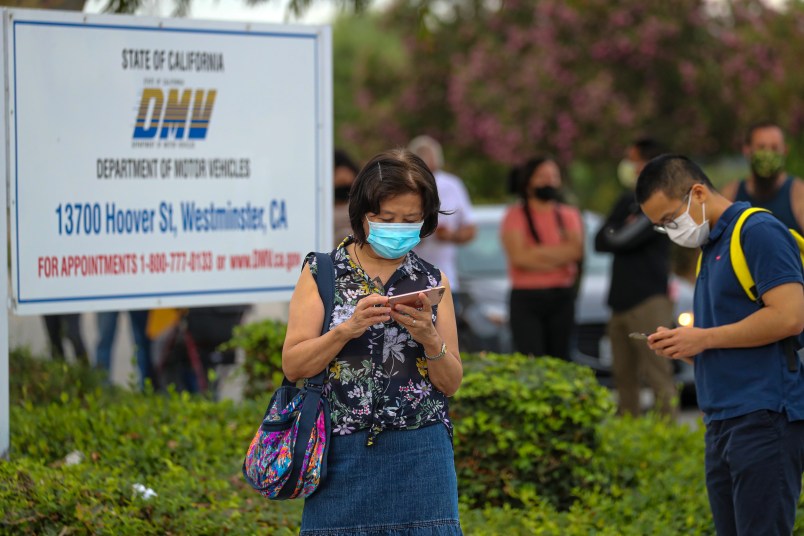Abigail Burman is better equipped than most to deal with the wrenches that COVID-19 has thrown into the voting process.
A recent law school grad who also has worked on political campaigns, she didn’t expect to have much trouble figuring out how to vote in Maryland, the state she had grown up in and moved back to over the summer after finishing school in California.
Yet the unique challenges presented by the pandemic frustrated her, just as they have frustrated voters across the country as they have tried to balance protecting their health with exercising their franchise.
Even in states with relatively relaxed and progressive voting rules, COVID-19 is complicating the act of casting a ballot in unexpected ways, and presenting challenges few could have foreseen outside the context of the pandemic.
For Burman, and for several other prospective voters TPM spoke to for this story, the problem was that registering online to vote required a state ID, but getting a state ID required a trip to the DMV, where COVID-related restrictions had created a months-long backlog for appointments.
Burman panicked when she realized that she might not be able to cast a ballot. She called the local Democratic Party and even her state representative for help. At one point, she contemplated having her parents print and mail a voter registration form to her, as she struggled to find any other way to register.
“When I worked for campaigns, we always carried the registration forms. So much of that burden is carried by unpaid campaign volunteers and the state doesn’t really have a backup, when that goes away,” Burman said.
Even the places she would normally go to print the form out herself were closed, and because she has asthma, the option of registering at an in-person voting site — which Maryland does offer — also felt risky.
The question of how to vote safely during a pandemic has dominated the national political discourse, as President Trump has sought to demonize mail-in elections and high-stakes battles have played out in courtrooms and state houses over how to loosen the rules for casting a ballot given the coronavirus outbreak.
But under the radar is how the pandemic has scrambled the process of even getting on to the voter rolls. The kind of in-person registration drives that often happen in election years are significantly limited in 2020. Trips to the DMV, another common location for registration, have slowed to a trickle. Election officials and voter advocates have had to create workarounds to navigate these obstacles.
TPM heard similar accounts from voters or the advocacy groups that work with them in places including New York, D.C., North Carolina and Washington.
“The DMV is currently the only online option to register to vote and if a person’s ID or license is out of date, in many cases they have to go in person to update it,” New York’s League of Women Voters Deputy Director Jennifer Wilson told TPM. “DMV visits are by appointment only and I’ve heard most of them are booked out for weeks.”
‘The Panic Starts To Set In’
Forty states offer online voter registration, according to the National Conference of State Legislatures, and voter advocates have pushed to expand its use in other states, given the way that the pandemic has hampered in-person registration opportunities.
But a not widely known hitch in the process is that registering online in many places requires a state ID, and for people who don’t already have that type of identification, getting one can prove impossible before the election, because of the way the need for social distance during the outbreak has strained drivers’ license offices.
Victoria Conner, who moved in July to Seattle from Indiana, found herself scrolling through reddit boards for advice on how to get a DMV appointment as she realized her lack of state ID was stymying her efforts to register online.
“Everyone is fighting for these [DMV appointment] spots and it’s nearly impossible to get one,” she said.
She tried twice, in July and August, to register via mail-in forms. Like many other states, Washington does not require a state ID for the physical forms, it’s only required for the online registration options. However, after each attempt, her registration still did not appear to have processed, and only after a reporter at another outlet called her local elections office to inquire about her account was her registration confirmed.
“First, the initial irritation is just not being able to get a driver’s license and then later on you realize that you can’t register to vote without it. And then the panic starts to set in,” Conner said.
Burman recalled a similar sense of anxiety. When she realized online registration wouldn’t be possible because she had not yet obtained a Maryland state ID, she scrambled to find a way to submit a paper form instead. The physical office of her county board of elections in Baltimore was closed due to COVID-19. She could pick one up at another elections office, but that would require her to drive to another county, and she didn’t have a car.

After reading the state statute closely, Burman decided that her severe asthma qualified her for a disability exemption for the online registration’s ID requirement. She was eventually able to register. But the stressful experience was educational for her.
“I went to law school. I worked in politics. I knew what levers to hit. It would have been so much harder if I hadn’t had those options available,” she said.
Baltimore County did not respond to TPM’s inquiry. But election officials in other Maryland counties have gotten creative to help voters who are facing this conundrum. Montgomery County, for instance, has left voter registration forms at local libraries so that they can be picked up by residents as part of the curbside services libraries are offering for renting books.
King County, which contains Seattle, told TPM that paper registration can be turned in at drop boxes through Friday, and that it will also accept photos or scanned versions of the physical applications that are submitted to election officials digitally.
Elsewhere, voter advocacy groups are lobbying for more DMVs to open up so that voters aren’t disenfrenachised by an inability to obtain an ID.
In Wisconsin, where an appeals court recently upheld an onerous voter ID requirement to vote, the local chapter of the advocacy group All Voting Is Local is lobbying for DMV sites to be open for longer hours, particularly in Milwaukee.
“The locations that are particularly within the city of Milwaukee — that are closest to the city, which may be on a bus route and things of that nature — the lines are there because of course more people are forced to go to [just three or four locations],” Shauntay Nelson, the Wisconsin state director for All Voting is Local, told TPM.
Voters Who Are ‘Confused And Intimidated’
Perhaps one of the biggest challenges for voters is the way in which confusion over the rules is colliding with these pandemic-related obstacles.
“Big picture, there are between 25 and 40 million voting age Americans who do not have a government issued photo ID,” said Kathleen Unger, the founder of VoteRiders, which provides assistance for voters struggling to comply with various ID requirements. “You could have as many millions who are so confused and intimidated by complicated and ever-changing laws that they are deterred from voting even if they have a valid ID.”
North Carolina’s voter ID requirement is on hold due to a court order, though an ID is still required for online registration.
Angela Tate told TPM that when her son, who just turned 18, was unable to get a DMV appointment before the election, she feared that he’d miss out on his first chance to cast a ballot.
It was only through VoteRiders that she learned that he wouldn’t need the ID to vote, and that if he went to an in-person early voting site, he could register to vote as well without the state identification.
She has since set up a time for VoteRiders to provide transportation for him to an early voting site to get registered and to vote.
“He was really stressed out because he was really looking forward to having his vote get counted,” Tate said. The assistance she got from VoteRiders, she said, “took the edge off.”
This story used tips from ProPublica’s Electionland project, of which TPM is a partner. Have you experienced problems voting? Share your story with us.







Remember back in what I call the Kris Kobach reign of terror days? Where it seemed like every state was pushing for some sort of voter ID law to vote? Well this is why it’s hard, people move from one side of the country to another. And even when we’re not in the time of a global pandemic the lines at the DMV are long. The info you need to prepare for your visit never quite matches up to what the clerk asks for, even if it’s not for an ID.
This is such a big issue. The registration deadline for Texas is long past, but people should not give up automatically. Sometimes they are already registered and don’t remember, either when they got an driver’s license or at an older address. Plus there are circumstances where they can vote with a limited ballot, e.g. if they have moved without reregistering.
In Texas, there is a lot more information at MyTexasVotes.com, and at their voter protection and assistance hotline, 844-TX-VOTES.
If you know anyone in Texas who is having issues or thinks they can’t vote, please direct them to those resources!
Opt-out registration is the answer…anything that shows you are a resident, from getting a license to paying the power bill, automatically puts you into the registration process, and the state confirms the registration. Take the burden off the voter and put it on the state, which has resources to confirm a person’s identity. Make it nationwide, with states required to assist in identifying people who move into the state. Do that (with the right details obviously), register everyone and make sure their registration is updated, and all of this goes away.
We might not get more voters, but at least registration will no longer be used as a way to disenfranchise Americans…this whole idea of keeping people from registering to vote is one of the most anti-American things happening today.
Can she vote in her old state with an absentee ballot up until the time she registers in her new state?
Why does the GOP hate democracy? Never mind, I know.